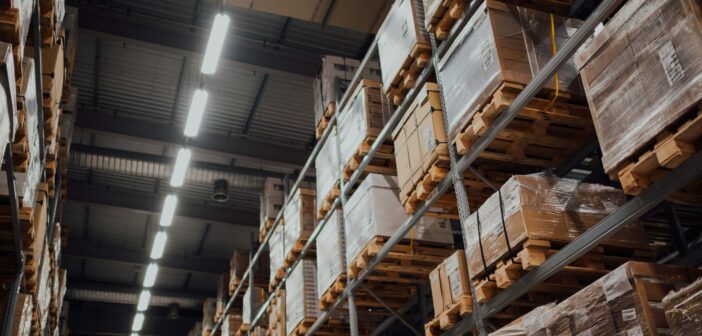Warrington has a vibrant economy founded on trust and integrity in markets, dynamic organisations, and places where businesses and people alike thrive. The subregion of England features a strong and diverse business base resilient enough to add new jobs for a highly skilled workforce.
The number of businesses active in Warrington is 42,000 – it’s a combination of success stories of local entrepreneurs, innovative start-ups, and brands (Siemens, AstraZeneca, Amazon, etc.). The most significant areas of employment are professional, scientific and technical services, and wholesale and retail trade.
As the vital pillar of the local economy, logistics is responsible for efficiently, affordably, and reliably moving goods, information, and resources. Supply chain challenges linger on, yet companies in Warrington are doing their best to mitigate problems for their customers by leveraging modern technology and innovation in fulfilment management. In logistics, innovation is all about improved and efficient processes and operations. Innovative logistics, as commonly referred to, focuses on integrating the latest developments in AI and machine learning to optimise processes, gain insight and support decision-making.
The Role of Logistics in Today’s Business Environment
In business, success in logistics leads to increased efficiency, lower costs, higher production rates, better inventory control, optimised warehouse space utilisation, and satisfaction in buyer-supplier relationships. Poor logistics can lead to untimely deliveries and failure to meet the requirements of the clientele, ultimately causing business failure. Logistics performance is positively impacted by supply chain management, which can, in turn, affect financial performance. The operational efficiency of a business depends on logistics practices, functions, and activities, so it’s essential to design and coordinate the supply chain distribution network to deliver goods and services most efficiently and effectively. Customer dissatisfaction is a very real thing.
Challenges Faced by Warrington Businesses in Logistics
The COVID-19 pandemic witnessed workplace restrictions and changes in consumer behaviour, including the adoption of delivery services and a historic high in consumption. Challenges were experienced, causing delays, disrupting supply chains and decreasing the volume of commodity flow. Many companies have been rethinking their supply chains and implementing changes to make them more resilient. After almost four years of enduring extreme challenges, the system is slowly but surely getting up. A lot has been done, but challenges still remain. The business sector in Warrington must face up to the challenges to ensure it remains valued by society.
Here are some of the most common obstacles faced by local businesses:
- The Energy-Intensive Nature of Logistics Processes: Logistics operations are energy-intensive, mainly powered by fossil fuels, so it’s necessary to leverage the efficiencies of a cross-modal approach to net zero, avoiding pitfalls such as stranded assets and disproportionate costs. Works have been completed for two units at Omega Business Park, delivered by McLaren Construction Midlands and North, both fitting in with net-zero targets.
- Skills Shortage Vacancies in High Skill Roles: The lack of employability skills still hinders logistics, which relies on highly trained, educated, and experienced segments of the workforce. Innovative solutions are emerging, as seen at Monta. This company exemplifies a focus on automation and innovation, where the optimization of processes has led to a reduction in required manpower. The collaboration between humans and robots ensures maximum efficiency in fulfilment UK centres.
- Lack Of an Effective Digital Transformation Strategy: A resilient business will need to build and optimise infrastructure to gain access to the best data and technology. Creating a digital strategy is critical in competing for attention and funding. The rapid proliferation of innovative logistics provides an opportunity to try and develop a system-level view of the transport network. Infrastructure and fleet upgrades can be supported with public funding.
Embracing Innovative Logistics Solutions
Great customer relationships are built on careful listening and, above all, trust. It’s up to the business to get shipments where they need to be at the right time. There’s no doubt that delays are impossible to avoid, but a little reassurance goes a long way towards fostering long-term loyalty, so businesses must remove customers’ fears and doubts. Companies are under pressure from governments, consumers, and other stakeholders to increase the efficiency of supply chain management in logistics, and the reputational costs of failing to address these concerns can be high. No business can solely fix the supply chain, yet it’s possible to address the complexities in the local economy.
Here’s a quick overview of the top logistics innovations in 2024 that will impact the supply chain.
Automated Inventory Management
Issues with forecasting, inventory tracking, and order fulfilment can eat into the bottom line, eroding profits. Attempting to juggle all variables manually is a recipe for disaster, so automating the inventory management process is the smart thing to do, as it minimises the risk of human error and enhances accuracy, allowing the company to focus on more value-added activities. THG, for instance, will eliminate many roles at its Warrington warehouse following the automation of its factories.
AI-Driven Supply Chain Optimisation
AI-driven supply chain optimisation offers a great many benefits, including but not limited to optimising routes in real-time, decreasing picking mistakes, speeding up order fulfilment, and identifying abnormalities and trends that might point to breakdowns. By taking advantage of AI and data analytics, businesses can extract valuable insights in terms of making informed decisions.
Eco-Friendly Delivery Options
Eco-friendly shipping encompasses everything from combining orders into one shipment to using low-carbon emitting modes of transportation. Warrington is one of the best-connected locations in the UK, so it presents a low risk for distribution centres. Given the city’s role in the logistic base, sustained inaction on the council’s part would impede the move toward low/zero emissions. For business, green delivery matters more than ever.
The Benefits of Efficient Fulfilment Services
Order management and fulfilment play a critical role in streamlining business processes, directly impacting customer satisfaction and loyalty, as people want their orders within the same or the next day. It involves coordinating various departments within the company, notably sales, inventory management and shipping, to ensure orders are fulfilled without errors or discrepancies. Innovative logistics can help businesses reduce costs in various ways, such as offsetting transportation costs, improving inventory management, and making the distribution centre more effective. Companies like Monta Fulfilment (montafulfilment.com/en) empower organisations to adopt an agile approach to digital transformation, improving customer experience and profitability.
Amazon, for instance, makes use of robotics at its fulfilment centre in Warrington to increase efficiency and delivery while enabling a greater selection at lower costs for its customers. For the sake of clarification, robotic order fulfilment is an efficient and effective way to deal with repetitive tasks that are risky or physically demanding and completed frequently by human workers. Companies that have moved to outsource fulfilment services have more time to focus on growing their brands by finding clarity and focus. The challenges we see today are drivers of change, and innovation is often necessary to adapt.
Concluding Thoughts
To sum up, logistical considerations play a key role in business. Changes in the business environment in Warrington have forced organisations, both large and small, to pay attention to improving energy efficiency in logistics, spanning the skills gap, and incorporating digital technology across appropriate facets. By investing in innovative logistics solutions and planning the order fulfilment strategy, local businesses can sustain economic growth and a high level of performance.




